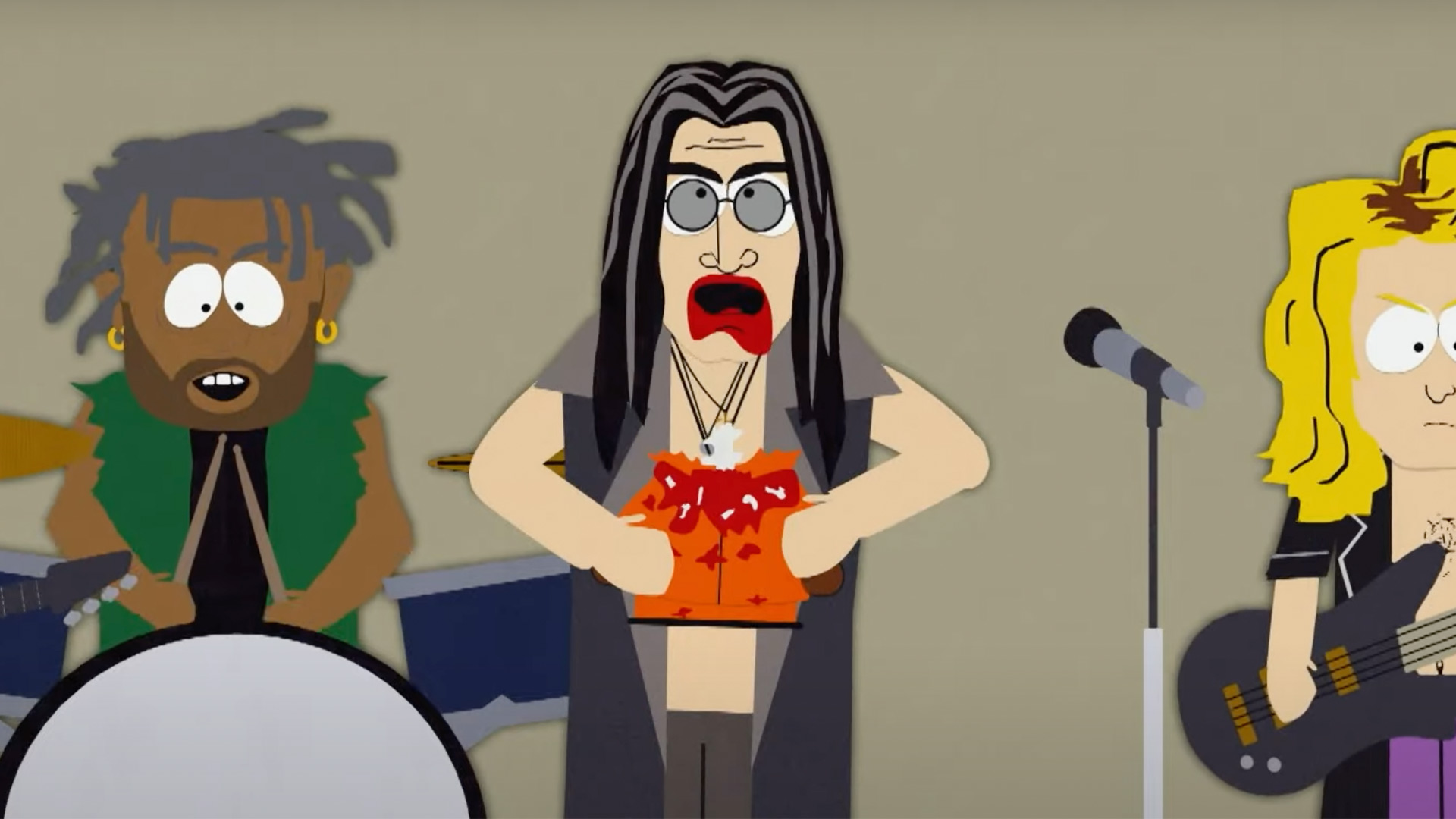South Park is the type of TV show that every channel wishes it had. Thanks to its creators Trey Parker and Matt Stone, it is quick, cheap and relatively easy to make. And ever since it first aired on Comedy Central in the summer of 1997, it has been hugely profitable.
The success of The Simpsons and Beavis and Butt-Head had unearthed a broad craving for adult animation. Plus, contemporary counterculture wasn’t as intellectual as it was visceral. Limp Bizkit won over a generation of rebels by rapping about using a chainsaw to skin your ass raw, while TV raged against the machine by letting you live vicariously through Stone Cold Steve Austin beating the shit out of his boss. South Park, then, was the perfect pop-cultural backdrop for a cartoon about children swearing up a storm in rural Colorado and taking the piss out of celebrities.
The show’s pilot episode – broadcast on August 13, 1997 – was titled Cartman Gets An Anal Probe. It was a vicious and vulgar parody of UFO conspiracy theories, animated inexpensively and, let’s be honest, hideously. Yet, South Park was an instant hit – especially on university campuses across the United States.
“Almost overnight, it was the hottest thing in town,” Vice journalist Kaleb Horton wrote on the cusp of the programme’s unprecedented nineteenth season in 2015. “It only took five months to become Comedy Central’s biggest show ever, averaging more than two million viewers per episode. The debut of its second season got 6.2 million viewers.”
As dangerous as South Park seemed to conservative parents, it was also inescapably part of America’s capitalist system. And, when that system discovers a cash cow, it milks it dry. By November 1997, South Park t-shirts were best-sellers, and deals had been struck for a video game, a book and all manner of ornamental Christmas knick-knacks. There was even an album the following year.
Chef Aid: The South Park Album was served up on November 24, 1998 during the show’s second season and demonstrated how seismic a pop-cultural force South Park was. The list of names attached to the 22-track compilation is so gigantic that you could mistake it for the guest list to the Grammy Awards. Elton John, System Of A Down, Ozzy Osbourne, Rancid, Puff Daddy, Rick James, Flea, Meat Loaf, Tom Morello and Ween all appear on the album. Primus, who performed South Park’s iconic theme song, returned, while Rick Rubin earned a credit as a producer. It was huge.
“Everyone wanted to be on The South Park Album,” show co-creator Matt Stone told Pitchfork in 2010. "We wanted to do [it] more as a Chef album” – referencing the show’s soul-loving source of advice and only competent grown-up, voiced by Isaac Hayes. “But of course it wasn’t going to sell any records; people wanted to hear Kid Rock and Ozzy and Puffy and shit. This sounds like kind of ancient history because that’s the way the record industry was in 1998. We were getting a lot of pressure: ‘Dude, South Park Album. South Park is big; you’ve got to do the big thing.’”
So that they could have their cake and eat it too, Stone and fellow South Park mastermind Trey Parker penned a tie-in episode that would both promote the album and give it a fictitious backstory to justify its existence. On October 7, 1998, the show’s 27th episode, Chef Aid, was broadcast.
The plot begins with Chef discovering that pop megastar Alanis Morissette has a new hit called Stinky Britches, which is a ripoff of a song he wrote while working in the music industry. His lawsuit against her label is thrown out and he’s countersued to the tune of $2 million. To raise money, the children of South Park sell sweets and unintentionally recruit musicians for an all-star benefit concert, which is what we hear on the album, complete with “live” applause and Chef acting as compère between tracks.
Initially, Chef Aid is just your standard early South Park episode: a blend of pop-cultural slashes and irreverent side-plots. In the B story, teacher Mr Garrison tries to find out who’s behind the attempts on the life of his inanimate best friend, Mr Twig. Plus, Johnnie Cochran – the attorney for O.J. Simpson during his infamous trial – and his “If the glove won’t fit…” strategy are parodied by the hilariously irrelevant Chewbacca defence. It’s a move that, unsurprisingly, fools the idiotic adult residents of South Park.
While that was an obvious, semi-topical swipe, according to Stone, the invoking of music industry plagiarism wasn’t meant to be a contemporary statement. “I think the Chef Aid episode came from us trying to come up with a concept that at least would look like we had a greater thought process behind having a lot of stars on the record,” he admitted to Pitchfork, before completely misremembering his own story. “We came up with the concept of a Chef Aid, to help him and his taxes or whatever.”
During the latter half is when things become special, as Stone and Parker corral the largest collection of guest stars in their show’s history. The South Park kids unwittingly bother Chef’s A-list music pals – including Elton John, Ozzy Osbourne, Meat Loaf and Puff Daddy – all of whom voice themselves in the episode as well as appear on the album.
Ozzy makes the funniest cameo, declaring that mishearing Chef inspired him to bite the head off of that bat. He then decapitates Kenny to continue the running gag of the hooded youngster’s regular deaths. For the creators though, it was getting to record with Elton John and Jane’s Addiction singer Perry Farrell that was the highlight of the process.
“It was a total dream for Trey because he grew up and learned to play piano listening to Elton John,” Stone told Pitchfork. “The one I completely remember being blown away with was Perry Farrell, who came in and did Hot Lava. And you know that stereotype; you’re thinking, ‘Oh, he’s going to be fucked up. We’ll have to do a hundred takes, and he’ll make us put it together on Pro-Tools.’ […] And then he gets into the booth, and then he just unleashes.”
The album is a bit of a hodgepodge, containing new South Park songs, musical numbers from old episodes and tracks completely unrelated to the show. Reviews praised the dark humour and the creativity of the benefit gig framing device, but were more conflicted on the actual musical content. Ozzy, Crystal Method, DMX and Ol’ Dirty Bastard tag-team for Nowhere To Run: a marriage of rapping, electro beats and industrial guitar that shouldn’t work as well as it does. On the other hand, during Will They Die 4 You, System Of A Down give their all to build a bouncing metal instrumental, but Puff Daddy sounds half-asleep rapping on top of it.
Nonetheless, the album sold brilliantly. It reached the top of the album charts in Australia, and made it to number 16 on the US’s Billboard 200. Since then, it’s gone platinum three times over in Australia, and once in both America and the UK.
In 2022, Chef Aid remains a testament to South Park’s power and the sheer immensity of the goodwill it received so soon after its debut. It may be childish, violent and vulgar, but evidently that’s the key to immortality if you emerged in the late 1990s.

